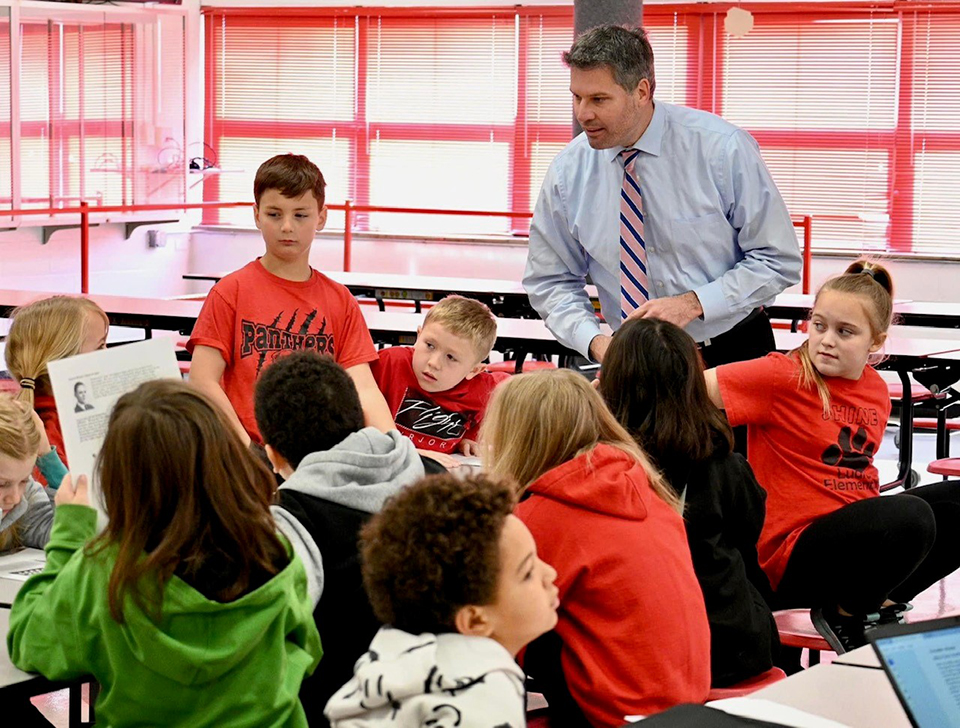
Angela Domingo, Kennedy Barbiea and Janeie Turner use a Little Tykes Young Explorer computer during Kate Neikirk’s class at Newport Preschool (Newport Independent). The computer was purchased with a grant from the United Way. The preschool acquired one for each of its two classrooms. Photo by Amy Wallot, May 19, 2011
By Susan Riddell
susan.riddell@education.ky.gov
When the Newport Independent school district began tracking preschool students in the late 1990s, administrators did so using a simple Excel spreadsheet.
That data proved to be so useful, the district kept it and expanded it. According to Reggie Taylor, district assessment coordinator, that spreadsheet is no longer sufficient.
“At first, it was very archaic… just that Excel spreadsheet. The database really expanded in 2007,” Taylor said. “But the vision for this was a regional initiative from the start. We wanted it to grow.”
Now, Newport Independent has a massive amount of information on its youngest students attending the Newport Preschool Village in an effort to keep them from falling behind on learning. The district compiles this data as part of a partnership called the Newport Early Childhood Initiative.
Members in this initiative include the Newport Preschool Village; Head Start; Children, Inc.; the Brighton Center; Northern Kentucky University; the United Way; Success By 6; and Strive, according to recently retired Assistant Superintendent Pamela Rye, who also directed the Newport Preschool Village program.
“We meet monthly to follow progress on our strategic plan, including data collection and analysis; outreach services; parent involvement; kindergarten readiness; instructional practices; transition and assessment,” Rye said.
“I think it’s unique that programs come together that don’t normally,” Taylor added. “It’s really a huge collaborative effort.”
Collecting the data
Taylor said data collection starts with compiling information from the parents.
“Parents complete a survey about background regarding the child from birth to age 4,” Taylor said. “It’s a program history, basically. All the information is put into an early childhood database, and then we track the data from there.”
Taylor said the initial survey resembles a standard enrollment form, asking questions like:
- From 0-3 months, where was your child?
- Has your child been in daycare before? With a family member?
- How involved are you as a parent?
“When the data first started out, we wanted to know if children are ready when they get to kindergarten,” Taylor said. “Now it’s evolved to be more specific, like how do we know Children’s Inc. is effective? Keeping all this data available, we can start tracking even more. Now, we can focus on what data is essential for us to make data-driven decisions.
“The data reaffirms the research that the more involved parents are, the more successful the child,” Taylor added. “Early childhood is so critical. Collecting this data really helps us get students where they need to be.”
In turn, Newport Independent shares the data (not specific to the child) with community child care providers, social services and parents as feedback for how each is preparing children for learning. Monthly meetings are held about how the daycare facilities are working and what specifically needs improvement based on the data.
Finding the right assessments
Newport Preschool Village has two classrooms, each offering a morning and afternoon session. About 65 students attend the preschool Mondays through Thursdays. Fridays are reserved for staff planning time, meetings and home visits.
Kate Neikirk is one of the preschool teachers. She said that collecting student data and assessing preschoolers must be done carefully if they are to flourish.
“Any assessment of young children needs to be developmentally appropriate,” Neikirk said. “Preschool children are unique in their approach to learning and interacting with materials. A developmentally appropriate assessment will give some insight into an individual child’s skill level and approach to learning.
“Assessments help guide instruction, inform parents and provide program review,” Neikirk added. “We use the data from the Dial-3 screen.”
Rye said the goal of data collection and assessment isn’t to get students “ready to test” when they start school.
“Just attending preschool is the largest step in kindergarten readiness,” Rye said. “We work with kindergarten teachers, and meetings are held with others in the collaboration to address this issue. We provide parent education and community involvement and are now trying to work with daycare facilities to help them.”
“By design, we want to look at the child holistically,” Taylor added. “When the concept of Response to Intervention came in, we knew we needed a design for that, too,” Taylor said. “We had to be able to identify weaknesses. We are constantly looking at more data to be able to identify those weaknesses.”
Neikirk agreed that early assessment is crucial in getting students extra help when they need it.
“We also keep anecdotal records on each student and score them in accordance to our HighScope Curriculum,” Neikirk said. “This is through Online COR (Child Observation Record), which is a Web-based child assessment tool. We also use teacher-made check lists to monitor progress.”
Neikirk said about 33 percent of the district’s kindergarten students come from the Newport Preschool Village, but that’s enough to help kindergarten teachers prepare their curriculum.
“The majority come from other sources such as Head Start and other private preschool sites,” Neikirk said. “(Even though) some have never attended preschool, the kindergarten teachers use screening results to prepare for instruction.”
Newport Preschool Village program also shares data with parents through conferences, home visits and family literacy programs, Rye said.
It’s important for the district to keep tracking these students’ progress, said Taylor, who also added that it’s critical for improving the practice.
“We’ve got some upcoming meetings where we want to discuss how to make this even better,” Taylor said. “We’ve honed in to where it’s what we wanted it to be, but how can we go more longitudinal? How can we involve Infinite Campus to do more tracking? Those are things we need to address.”
Regardless of where this effort goes, Taylor is appreciative of the results it’s produced.
“The most interesting thing to me just from looking at the data was the realization of the number of students in kindergarten who were less and less prepared,” Taylor said. “With this initiative and being proactive in approach, it’s made a difference. Our students are prepared.”
MORE INFO…
Reggie Taylor, reggie.taylor@newport.kyschools.us, (859) 292-3092
Kate Neikirk, kate.neikirk@newport.kyschools.us, (859) 292-3021



Leave A Comment